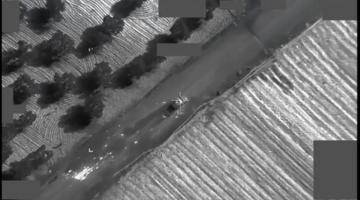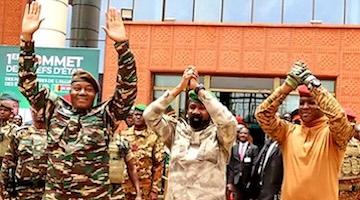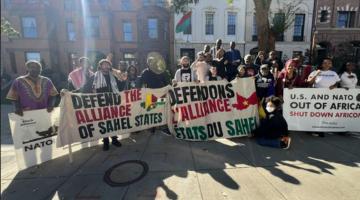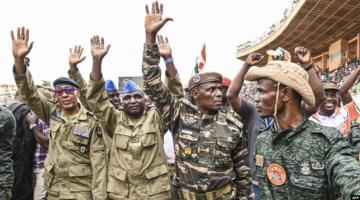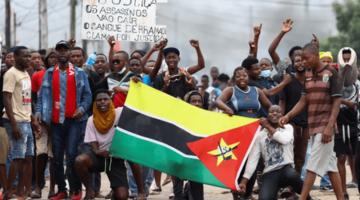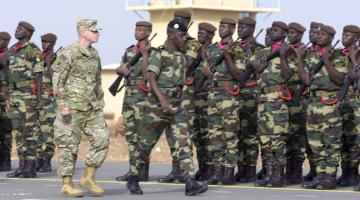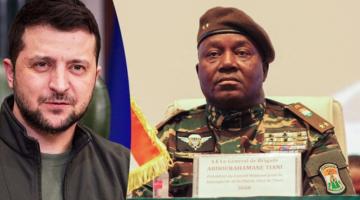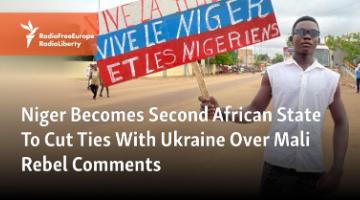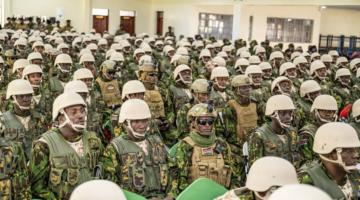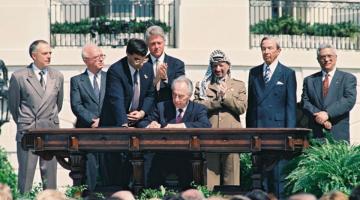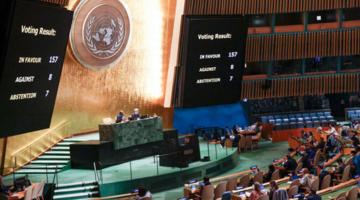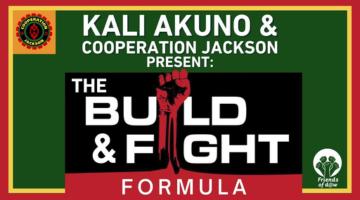What is the real objective of a US foreign policy in Africa which offers military aid, weapons, logistics and training to the armed forces of more than 50 of the 54 nations of the most war torn and impoverished continent on earth? Is it building and strengthening civil societies? Or is the permanent state of insecurity, dependence, endemic violence and poverty which characterizes Africa today just better for business?
This story was orginally published in Black Commentator on July 7, 2003
"Our policy with respect to the continent of Africa at best has been a policy that is inconsistent and incoherent," said NAACP Executive Director Kweisi Mfume, in Miami Beach last weekend for the organization’s annual convention. "We've looked away in many instances because Africa was not politically correct or politically cute."
Mr. Mfume is wrong. United States policy towards sub-Saharan Africa has been consistent since August of 1960, when President Eisenhower ordered his national security team to arrange the assassination of Congolese leader Patrice Lumumba. Congo had been nominally independent from Belgium for only two months, yet Eisenhower, far from looking away from Africa during his last months in office, was already embarked on a relentless policy of continental destabilization, one that has been fundamentally adhered to by every U.S. President that followed.
U.S. policy in Africa is anything but “incoherent.” Rather, too many of us have “looked away” from the clear pattern of U.S. behavior and intent – a ferocious, bipartisan determination to arrest African development at every opportunity and by all possible means – including the death of millions.
War on African civil society
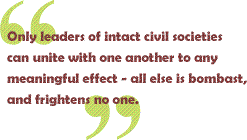 Belgians murdered Prime Minister Lumumba on January 17, 1961, no doubt with the collaboration of Eisenhower’s men. Lumumba presented a danger to European and American domination of post-colonial Africa precisely because he was not a tribal figure, but a thoroughly Congolese politician, a man who sought to harness power through popular structures. As such, Lumumba personified the threat of an awakened African civil society – the prerequisite for true independence and social development.
Belgians murdered Prime Minister Lumumba on January 17, 1961, no doubt with the collaboration of Eisenhower’s men. Lumumba presented a danger to European and American domination of post-colonial Africa precisely because he was not a tribal figure, but a thoroughly Congolese politician, a man who sought to harness power through popular structures. As such, Lumumba personified the threat of an awakened African civil society – the prerequisite for true independence and social development.
A popular and long held belief among Africans and African Americans is that the prospect of continental (or even global) African “unity” is what terrifies Washington, London and Paris. We wish that were true. However, the neocolonial powers know they have nothing to worry about on that score, having begun the era of “independence” with a clear understanding among themselves that conditions for meaningful unity would not be allowed to develop. African civil society itself would be stunted, hounded, impoverished – rendered so fundamentally insecure that, even should “leaders” of African countries band together under banners of “unity,” few could speak with the voice of the people. Only leaders of intact civil societies can unite with one another to any meaningful effect – all else is bombast, and frightens no one.
Tribalism is, indeed, a problem in Africa. For Americans and Europeans, it is an obsession – the game they have played since the Portuguese planted their first outposts at the mouths of African rivers in the 1400s. However, there are limits to the effectiveness of tribal manipulation. Many “tribes” are very large – nations, actually. Setting one tribal group against the other, while suppressing the social development of each, is a tricky business. The colonizer must not to allow the “favored” group to accrue, through privilege, sufficient social space to aspire to nationhood. In that event, the formerly favored group must be crushed by the colonizer’s own military force – a brutish and costly business.
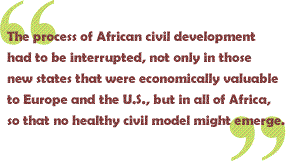 These are generalities, and Africa is a big place. Numerous colonial powers at different times employed the full mix of coercion, manipulation, favoritism, and raw (including genocidal) force.
These are generalities, and Africa is a big place. Numerous colonial powers at different times employed the full mix of coercion, manipulation, favoritism, and raw (including genocidal) force.
After World War Two, and for a host of reasons, the colonial arrangement had become untenable. Europeans would continue to engage in tribal manipulation in the new political environment, while the U.S. preferred bullets and bribes as it assumed overlord status among the imperialists. However, it was clear to the old masters – and especially to Washington – that the formal structures of independence would inevitably lead to the growth of dynamic civil societies that could impede the operations of multinational extraction corporations and agribusiness. Civil societies can become quite raucous and demanding, even in countries in which there are tribal divisions. Therefore, the process of African civil development had to be interrupted, not only in those new states that were economically valuable to Europe and the U.S., but in all of Africa, so that no healthy civil model might emerge. If this could be achieved, there would be no need to fear the actions of assembled heads of African states – an irrelevant gaggle of uniforms and suits, standing in for nations, but representing no coherent social force.
Assignment: crush the people
To thwart the growth of civil society in newly independent Africa, the imperialists turned to the Strong Men. It is probably more accurate to say that the imperialists invented the African Strong Man. Although both the neocolonial masters and the Strong Men themselves make a great fuss about indigenousness – albeit for somewhat different reasons – these characters arise from the twisted structures of colonialism. Their function is to smother civil society, to render the people helpless.
Joseph Desire Mobutu is the model of the African Strong Man. He was an American invention whose career is the purest expression of U.S. policy in Africa. With all due respect to the NAACP’s Kweisi Mfume, there was nothing “inconsistent and incoherent” about Mobutu’s nearly four decades of service to the United States. From the day in August, 1960 when Eisenhower ordered the death of Lumumba (Mobutu, Lumumba’s treasonous chief of the army, deposed his Prime Minister the next month and collaborated directly in the murder) to his death from cancer in 1997, U.S. African policy was inextricably bound to the billionaire thief. It can be reasonably said that Mobutuism is U.S. African policy.
Mobutu and nine U.S. Presidents (Eisenhower through Clinton) utterly and mercilessly poisoned Africa, sending crippling convulsions through the continent, from which Africa may never recover. With borders on Angola, 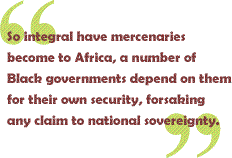 Zambia, Tanzania, Burundi, Rwanda, Uganda, Sudan, the Central African Republic, and Congo (Brazzaville), and a land mass as large as the U.S. east of the Mississippi, Mobutu’s Zaire was an incubator of never ending war, subversion, disease, corruption and, ultimately, social disruption so horrific as to challenge the Arab and European slave trade in destructive intensity.
Zambia, Tanzania, Burundi, Rwanda, Uganda, Sudan, the Central African Republic, and Congo (Brazzaville), and a land mass as large as the U.S. east of the Mississippi, Mobutu’s Zaire was an incubator of never ending war, subversion, disease, corruption and, ultimately, social disruption so horrific as to challenge the Arab and European slave trade in destructive intensity.
Mobutu’s reign began in the heyday of European soldiers of fortune, allies of his like “Mad Mike” Hoare. By the time of his death, more than 100 mercenary outfits operated in sub-Saharan Africa, safeguarding multinational corporations from the chaos that Mobutu and his American handlers labored so mightily to foment. So integral have mercenaries become to Africa, a number of Black governments depend on them for their own security, forsaking any real claim to national sovereignty. This, too, is the legacy of U.S. African policy. (American mercenary corporations garner an ever-increasing share of the business.)
Millions died in Zaire-Congo and neighboring states as a direct or indirect result of policies hatched in Washington and executed by Mobutu – and this, before the genocidal explosion in Rwanda in 1994, leading to an “African World War” fought on Congolese soil that has so far claimed at least 3 million more lives, belated victims of the policies dutifully carried out by America’s African Strong Man.
Bush cultivates more Mobutus
For 43 years U.S. governments have empowered Strong Men to do their bidding in Africa. The geography and riches of Congo-Zaire allowed Mobutu to wreak continent-wide havoc on Washington’s behalf, while growing fabulously 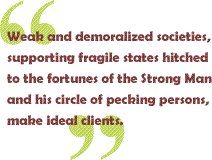 rich. However, many lesser clients have been nurtured by successive U.S. governments, their names and crimes too numerous for this essay. They and Mobutu’s outrages are the logical product of the neocolonialist program. The actors come and go, but the underlying design remains the same: to prevent the emergence of strong civil societies in Black Africa.
rich. However, many lesser clients have been nurtured by successive U.S. governments, their names and crimes too numerous for this essay. They and Mobutu’s outrages are the logical product of the neocolonialist program. The actors come and go, but the underlying design remains the same: to prevent the emergence of strong civil societies in Black Africa.
The Strong Man’s job is to create weak civil societies. Weak and demoralized societies, supporting fragile states hitched to the fortunes of the Strong Man and his circle of pecking persons, pose little threat to foreign capital.
The African Strong Man model suits the purposes of European imperialists and the United States, perfectly. Their overarching concern– especially since the collapse of the Soviet Union – is for the multinational mineral and petroleum-extracting corporations – what Europeans and Americans are actually referring to when they speak of their “national interests” on the continent. Representing himself and a small base of supporters/dependents, the Strong Man can be counted on to bully civil society into steadily narrowing spaces, snuffing out all independent social formations, while at the same time stripping the society of the means to protect itself outside of his own, capricious machinery. The nation itself atrophies, or is stillborn, as in Congo. Where nations have not had the chance to take full root or have been deliberately stunted, the Strong Man wraps the thin reeds of sovereignty around himself, denying the people their means of connectedness to one another, except through him. The state is a private apparatus and – from the standpoint of civil society – there appears to be no nation, at all. The people act, accordingly – that is, they do not act as citizens of a nation.
Thus, the Strong Man’s most valuable service to the foreign master is to retard and negate nationhood through constant assaults on civil society.
What is commonly described as American “neglect” of Africa is nothing of the kind. Over the course of the decades since the end of formal colonialism, the governments of the corporate headquarters countries have arrived at a consensus that a chaotic Africa, barely governed at all, in which civil societies are perpetually insecure, incapable of defending themselves much less the nation, is the least troublesome environment for Western purposes. The extraction corporations in Africa feel most secure when the people of Africa are insecure.
In Congo and Liberia-Sierra Leone, this unspoken but operative policy has plunged whole populations into Hell on Earth. African Americans typically criticize the U.S. for failing to treat Black lives as valuable – in other words, Washington is accused of neglecting the carnage in Central and West Africa because of racism. The reality is far worse than that. American policy is designed to place Africans at the extremes of insecurity, in order to foreclose the possibility of civil societies taking root. This policy has always resulted in mass death. Moreover, the U.S. did not simply sit idly by while genocide swept Rwanda and “World War” wracked Congo. Instead, the American government initially thwarted a world response to the Rwandan holocaust, and has prolonged the carnage in Congo through its two client states, Uganda and Rwanda, which have methodically looted the wealth of the northeastern Congo while claiming – falsely, according to a report to the UN Security Council – to be protecting their own borders. Uganda’s list of “proxy” Congolese ethnic armies reaches into every corner of Ituri province, where “combatants…have slaughtered some five thousand civilians in the last year because of their ethnic affiliation,” according to a Human Rights Watch report. “But the combatants are armed and often directed by the governments of the DRC [Democratic Republic of Congo], Rwanda and Uganda.” (“Ituri: Bloodiest Corner of the Congo,” July 8.)
Zimbabwean officers have also plundered the country, but have been involved in far less killing in their role as protectors of the Democratic Republic of Congo (DRC) government. Angola and Namibia also went to the Kinshasa regime’s aid. The United Nations and African countries labored for five years to untangle the mix of belligerents – with only the most pro forma cooperation of the United States.
Prolonging “Africa’s World War”
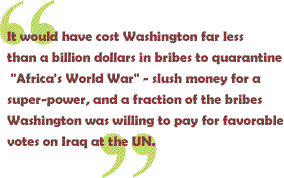 Had the U.S. wanted to end or at least scale down “Africa’s World War,” there is no doubt that Washington could have reined in Rwanda and Uganda, who received a steady stream of American military and economic assistance during the conflict. The Congolese (DRC) government, on the other hand, has suffered under severe sanctions from both the U.S. and the European Union.
Had the U.S. wanted to end or at least scale down “Africa’s World War,” there is no doubt that Washington could have reined in Rwanda and Uganda, who received a steady stream of American military and economic assistance during the conflict. The Congolese (DRC) government, on the other hand, has suffered under severe sanctions from both the U.S. and the European Union.
It would have cost Washington far less than a billion dollars in bribes to quarantine “Africa’s World War” – slush money for a super-power, and a fraction of the bribes Washington was willing to pay for favorable votes on Iraq at the UN. Instead, the U.S. provided aid to key combatants. That’s not a lack of policy, nor is it indifference. In the larger scheme of things, Washington believed that prolonging a war that weakened and debased Africa was in its “national interest.”
Uganda and Rwanda have reciprocated, shamelessly. “Recently Uganda publicly backed the U.S.-led attack on Iraq, defying the African position to endorse a UN-sanctioned war,” reads the current message of the official State House website of President Yoweri Kaguta Museveni’s government, in Kampala.
Rwanda’s Ambassador to the U.S., Zac Nsenga, was even more obsequious when presenting his credentials at the U.S. State Department, May 8:
“The Rwandan Government reaffirms its commitment to join forces with the United States and the free world to combat acts of terrorism wherever it rears its ugly head. The events of the 1994 Genocide and September 11th has taught us that we have to stand together as Nations to defeat these evil acts against humanity. For this very reason President Kagame stood firmly in support of the U.S. led attack on Iraq, not only to root out a terrorist dictator but also to free the people of Iraq.”
Three million dead in Congo mean nothing when compared to two eager clients in the heart of Africa, who are more than willing to both defy “the 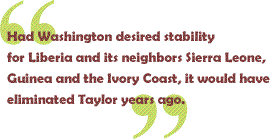 African position” on Iraq and help keep Central Africa chaotic – Mobutu’s old job.
African position” on Iraq and help keep Central Africa chaotic – Mobutu’s old job.
As for Charles Taylor, the Liberian Strong Man responsible for the death, dismemberment and displacement of hundreds of thousands in his own country and neighboring Sierra Leone – at the time of this writing, Bush was still playing games over whether Taylor should leave for Nigerian exile before or after an African peace keeping force arrives to secure the capital, Monrovia.
Concerned American progressives debate what their positions should be if Bush sends significant U.S. forces to help pacify the country. He will not. If history is any judge, U.S. involvement on the ground in Liberia will be token, if any, and brief – just enough to show the flag. Had Washington desired stability for Liberia and its neighbors Sierra Leone, Guinea and the Ivory Coast, it would have eliminated Taylor years ago. He was allowed to live because he served U.S. policy, whether he knew that or not. Eternal warfare is the most effective way to smother civil society.
Americans may also one day learn this horrible lesson.

